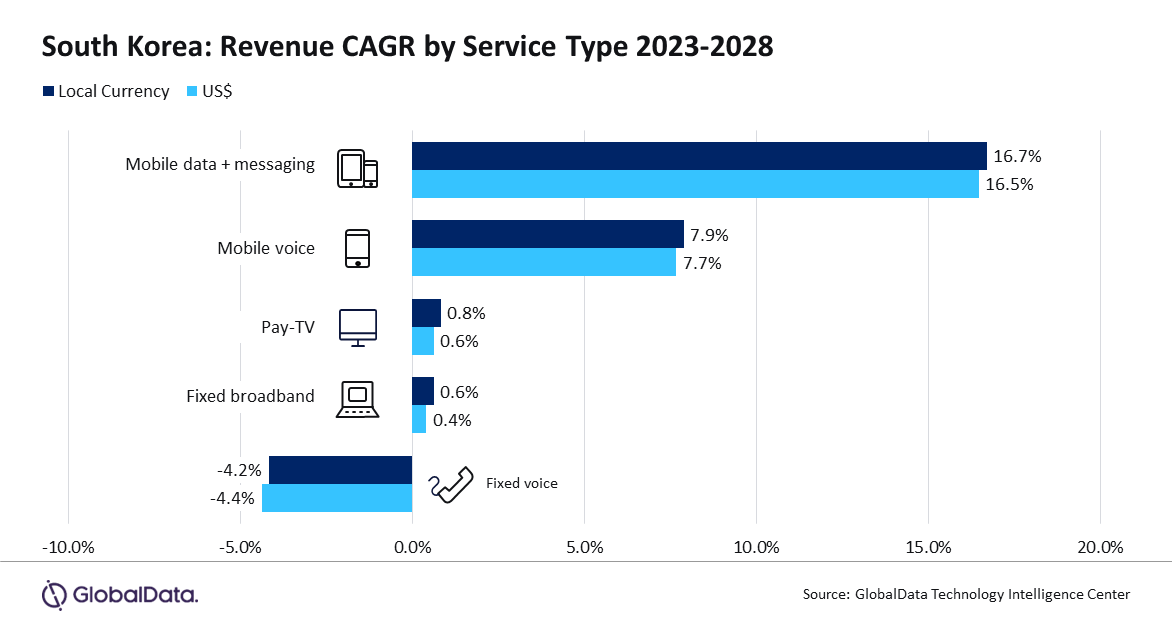
The telecom and pay-TV services revenue in South Korea is forecast to increase at a compounded annual growth rate (CAGR) of 10.3% during 2023-2028, supported by strong growth in the mobile data segment, according to GlobalData, a leading data and analytics company.
GlobalData’s South Korea Telecom Operators Country Intelligence Report reveals that the mobile data service revenue in the country will increase at a healthy CAGR of 17.6% over the forecast period, driven by growing data consumption and 5G subscriptions, yielding a higher mobile data average revenue per user (ARPU).
Aasif Iqbal, Telecom Analyst at GlobalData, comments: “4G services will account for the largest share of the total mobile subscriptions in South Korea in 2023. However, the share of 4G subscriptions will decline drastically during the forecast period, owing to the migration of subscribers from 4G to 5G networks”.
“5G share will increase rapidly to reach 78.7% in 2028, supported by a strong focus on 5G network expansions and service improvements by telcos and the local government. The South Korean government aims to ensure consistent 5G access throughout the country, including rural areas and remote islands, by the end of 2024.”
In the fixed communication services segment, voice service revenue will decline over 2023-28 due to a decline in fixed voice service ARPU and subscription losses in both the voice over Internet Protocol (VoIP) and circuit-switched segments. Fixed broadband service revenue, on the other hand, will grow albeit marginally at a CAGR of 0.4% during the period, primarily supported by growth in FTTH/B service adoption.
Aasif adds: “Growing demand for higher-speed broadband connectivity and efforts to expand fiber-optic network infrastructure across the country will support growth in fiber broadband service adoption over the forecast period. For instance, the telecom regulator KCC is aiming to achieve 100% FTTH (fiber-to-the-home) coverage across the nation by 2030. This ambitious goal involves expanding fiber optic infrastructure to rural and remote areas currently underserved by traditional copper networks.”
Pay-TV service revenue in South Korea will increase, albeit marginally, at a CAGR of 0.6% during 2023-28. While a continued drop in cable TV and DTH subscriptions will drag down overall revenue growth, a steady rise in IPTV subscriptions will lend support to the overall market and prevent further decline in total pay-TV revenue.
Aasif concludes: “SK Telecom will lead the mobile services market in 2023 in terms of subscriptions and will continue to hold the top position throughout the forecast period, supported by its discounted monthly pricing along with unlimited and shareable data options. The company is also focusing on M2M/IoT services to drive opportunities in the enterprise segment.
“KT will lead the fixed voice, fixed broadband, and pay-TV segments in 2023. In the fixed broadband market, KT will maintain its leading position, supported by its strong foothold in the FTTH segment and its promotional fiber broadband plans bundled with mobile or pay-TV services. In the pay-TV services segment, KT is seeking to boost its content library to drive subscription growth.”








